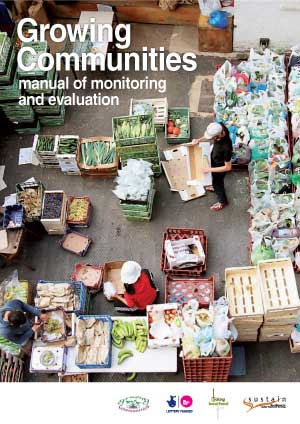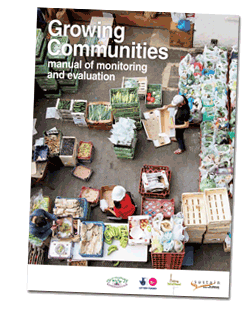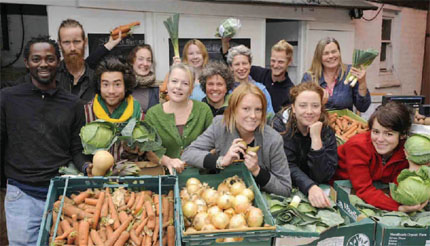
Growing Communities: manual of monitoring and evaluation
 This report details the way in which the pioneering social enterprise, Growing Communities, monitors and evaluates its work. As well as explaining the criteria they use, it also explores why they think this is an important way of helping the community food sector improve their enterprises, whilst also providing evidence of their social and environmental benefits.
This report details the way in which the pioneering social enterprise, Growing Communities, monitors and evaluates its work. As well as explaining the criteria they use, it also explores why they think this is an important way of helping the community food sector improve their enterprises, whilst also providing evidence of their social and environmental benefits.
Growing Communities is a pioneering Hackney-based social enterprise that uses the collective buying power of their community to create a market for sustainable food producers. Over the past ten years, they have created two main community-led trading outlets: an organic fruit and
vegetable box scheme and the Stoke Newington Farmers’ Market. They have also developed urban food growing sites where they grow food for the box scheme. The growing sites also provide training for the Growing Communities apprentice growers and volunteers.
"Gathering enough of the right information will put you in a much better position to make the most informed decisions you can, as well as providing evidence – directly or by implication – that what you are doing is making a difference. We need to prove that we are not just a niche market – we are serious and the issues we work on are serious. Monitoring and measuring our impact is one important way that serves this aim."
Julie Brown, Director, Growing Communities
As Growing Communities explains, their work has enabled them to:
- Create a practical way for the community to tackle the issues of climate change and resource depletion, while simultaneously building community and creating jobs.
- Feed 3,000 people a week (of which about a third consider themselves to be on a low income).
- Provide reliable market outlets for 30 small-scale local organic farmers and processors.
- Generate a turnover of £450,000 per year, having become financially self sufficient.
- Employ 20 part-time staff.
- Support new food growers and community engagement with food growing, training apprentices and also finding urban growing spaces for them to cultivate once they have completed their training.
- Engage with the community by encouraging site visits and volunteering. In 2011, nearly 120 volunteers worked with Growing Communities on their sites and over 1,000 people visited.
- Start replicating the Growing Communities model in other places around the UK, providing an intensive programme of support to help more communities do what they have done.
- Attract the interest and vocal support of policy-makers, campaigners and progressive funding organisations.

Growing Communities believes the model they have created is successful, sustainable and replicable. It could play a part in building a movement to transform food and farming through community-led trade. The reason they are able to say this with some confidence is that they understand their enterprise model in great depth, and because of their monitoring and evaluation.
This is vital for two reasons:
- Firstly, regular monitoring and reporting helps them to keep a check on the health, vitality and resilience of the enterprise. They can identify problems early and tackle them. They are able to plan ahead, set targets, monitor progress and celebrate success.
- Secondly, collection of data through monitoring and evaluation helps them to demonstrate to their members and to other communities and supporters that their work is really making a difference – to their community, to their employees and volunteers, to their food producers and to the environment.
This document outlines how Growing Communities monitors and evaluates their work with well-developed systems built up over several years of trading and growth. The intention behind producing this manual is to reinforce the importance of this work for Growing Communities, and also to help them plan how to advise other communities adopting the Growing Communities model and participating in the Growing Communities Start-up Programme.
Report contents
- Why monitoring and evaluation are important
- The Growing Communities Key Principles
- Measuring the Key Principles and their impact
- What monitoring tools do we use?
- Annual analysis
- Staff brainstorm
- Customer surveys
- Staff surveys
- Produce data
- Visitor data
- Land use data
- Additional measurements and claims
Concluding thoughts
Appendices (downloadable templates, provided as a .zip file)
- Appendix A: Producer Certification Criteria
- Appendix B: Box Scheme Buying Policy
- Appendix C: Box scheme customer survey and Farmers’ market customer monitoring survey
- Appendix D: Farmers’ market rules
- Appendix E: Growing Communities Annual Report
Making Local Food Work: Making Local Food Work aimed to reconnect people and land through local food by increasing access to fresh, healthy, local food with clear, traceable origins.
Sustain
The Green House
244-254 Cambridge Heath Road
London E2 9DA
020 3559 6777
sustain@sustainweb.org
Sustain advocates food and agriculture policies and practices that enhance the health and welfare of people and animals, improve the working and living environment, promote equity and enrich society and culture.
© Sustain 2026
Registered charity (no. 1018643)
Data privacy & cookies
Icons by Icons8